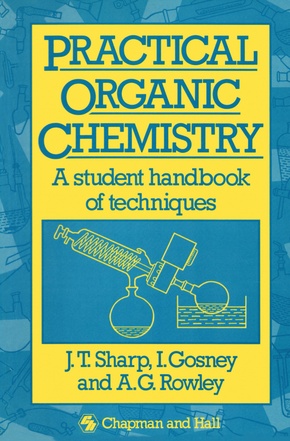
Practical Organic Chemistry - A student handbook of techniques
| Verlag | Springer Netherlands |
| Auflage | 1989 |
| Seiten | 200 |
| Format | 15,6 x 23,5 x 1,2 cm |
| Gewicht | 343 g |
| Artikeltyp | Englisches Buch |
| EAN | 9780412282300 |
| Bestell-Nr | 41228230EA |
One of the very best things about organic chemistry is actually doing experimental work at the beneh. This applies not only at the profes sionallevel but also from the earliest stages of apprenticeship to the craft as a student. The fascination sterns from the nature of the sub ject itself, with its vast array of different types of reaction and its al most infinite variety of different chemical compounds. Each reaction and each new compound pose their own particular problems to chal lenge the skill and ingenuity of the chemist, whether working in a first-year teaching la bora tory or at the frontiers of research. This book is intended to provide basic guidance in the essential experimental techniques used in a typical undergraduate course. It gives concise coverage of the range of practical skills required, from first-year level when students may have no previous experience, up to final-year level when students are usually involved in more complex and dem an ding experimental work in supervised research projects. Our objective was to produce a handbook of techniques that could be used with a variety of practical courses throughout a student's whole period of study. Those who run practical courses generally have strong feelings about what particular experiments or exercises are appropriate for their own students, and it is rare that a book of experiments suitable for one department is acceptable to another.
Inhaltsverzeichnis:
1 Introduction.- 1.1 The range of experimental techniques.- 1.2 Good laboratory practice.- 1.3 Safety in the laboratory.- 1.4 Keeping records.- 1.5 Samples and spectra.- 2 Carrying out reactions.- 2.1 Basic techniques.- 2.2 Special techniques.- 3 Isolation and purification of reaction products.- 3.1 Primary work-up procedures.- 3.2 Crystallization.- 3.3 Melting point.- 3.4 Distillation.- 4 Separation of organic mixtures by chromatography.- 4.1 Analytical methods.- 4.2 Preparative methods.- 4.3 Appendices.- Preparation of samples for spectroscopy.- 5.1 Infra-red.- 5.2 Nuclear magnetic resonance.- 5.3 Mass spectrometry.- 5.4 Ultraviolet.- Finding chemical information.- 6.1 Physical properties.- 6.2 Spectroscopic properties.- 6.3 Beilstein's Handbuch.- 6.4 Chemical Abstracts.
